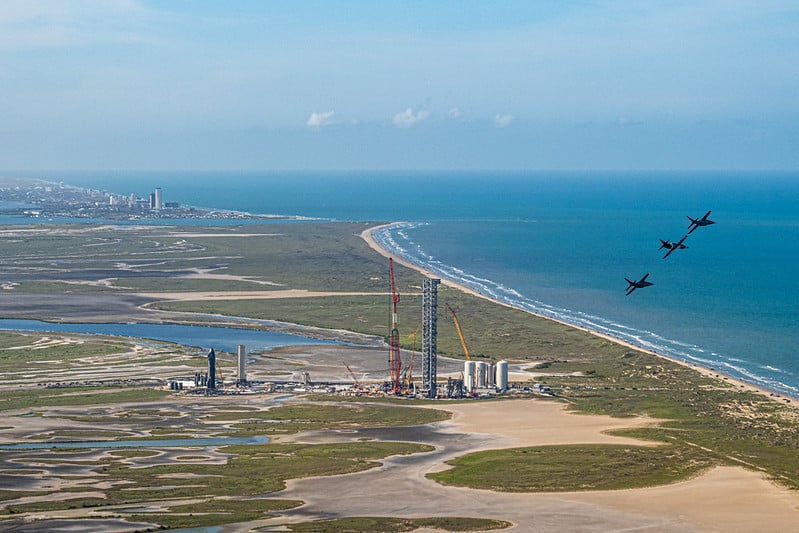In the dusty plains of South Texas where rockets regularly touch the sky, a new municipality has been born. With a decisive 212-6 vote on May 3, 2025, SpaceX’s launch facility area officially became the City of Starbase , Texas—a development years in the making since Elon Musk first tweeted about the possibility in 2021.
The newly minted cosmic community spans approximately 3.9 square kilometers in Cameron County, where nearly 500 residents—mostly SpaceX employees—now find themselves citizens of Texas’ newest municipality. The landmass, roughly equivalent to 1.5 square miles, transforms from company campus to genuine civic entity with full governmental powers under Texas’ Type C municipal classification .
“The incorporation petition submitted in December 2024 contained the requisite signatures under Texas Election Code § 9.004,” noted official documentation from Cameron County, which prompted Judge Eddie Treviño Jr. to schedule the May election. Among 283 eligible voters, 218 cast ballots, with early voting held April 22–29 prior to the main Election Day.
Launch Pad Politics
The political landscape of this orbital outpost comes pre-configured with unopposed SpaceX affiliates assuming leadership roles. Robert “Bobby” Peden, Vice President of SpaceX Texas Test & Launch Operations, steps into the mayor’s office without electoral challenge, while SpaceX managers Jordan Buss and Jenna Petrzelka similarly glide into commissioner positions.
As a Type C municipality (reserved for populations under 5,000), Starbase gains substantial terrestrial powers:
- Property taxation authority up to 1.5 %
- Zoning regulation capabilities
- Local control over utilities and infrastructure
- Permitting authority for construction and development
Perhaps most critically for SpaceX operations, pending legislation (Senate Bill 2188 / House Bill 4660) would transfer authority over weekday closures of Texas Highway 4 and Boca Chica Beach from Cameron County to the newly formed city government—a contentious point for local residents accustomed to beach access.
Environmental Trajectory
The Federal Aviation Administration’s Mitigated Finding of No Significant Impact (FONSI) issued June 13, 2022, continues to guide Starship/Super Heavy launches . This regulatory framework permits up to 25 annual launches provided SpaceX implements over 75 mitigation measures related to wildlife protection, noise control, and road-opening protocols.
Environmental compliance remains rocky terrain for the aerospace enclave. Approximately $150,000 in fines were assessed by the EPA and Texas Commission on Environmental Quality in 2024 for alleged wastewater violations , though SpaceX characterized these as mere “paperwork disagreements.”
The launch zone’s environmental record includes 19 reported incidents between 2019 and mid-2024, ranging from fires to leaks and unauthorized testing, according to documentation cited in the incorporation materials.
Cultural Countdown
Indigenous perspectives provide a grounding counterpoint to the upward-looking ambitions of Starbase. Chair Juan Mancias of the Carrizo/Comecrudo Tribe has warned that incorporation erases “sacred hills” and tribal history near Los Corales Ranchería.
“Generations of fishing, camping, and cultural rituals at Boca Chica Beach risk further restriction under proposed weekday-closure authority,” notes documentation from advocacy groups concerned about public-access rights .
An appeals court ruling on February 2, 2024, previously reinforced public-access rights, reversing a lower court’s approval of beach closures—legal precedent now potentially circumvented through the incorporation and pending state legislation.
Infrastructure Orbit
Municipal control promises accelerated development cycles for roads, utilities, and housing—crucial elements as SpaceX seeks to expand its workforce in the Rio Grande Valley region.
The Starship program’s manufacturing hub requires specialized facilities and personnel, with the newly established local government expected to streamline zoning regulations for multi-unit housing construction on company-owned lots.
Legislative Launch Window
Texas Senate Bill 2188, engrossed April 30, 2025, represents the legislative vehicle through which weekday beach-closure authority would transfer to Starbase municipal control. The companion House Bill 4660 currently awaits action in the House Calendars Committee.
County opposition remains firm, with Judge Treviño and Cameron County commissioners publicly objecting to the potential loss of oversight and public-access restrictions.
The South Texas Environmental Justice Network has mobilized significant opposition, winning a narrow 7-6 vote against SB 2188 in the House State Affairs Committee, though the bill has since been revived.
Atmospheric Reentry
As Starbase’s inaugural council prepares to convene this summer, the unprecedented fusion of corporate enterprise and municipal governance enters uncharted territory. The foundation of what some legal scholars describe as a “near-entirely company-staff city” creates a novel model in American civic structures.

The cosmic community’s formation represents a practical terrestrial testbed for Musk’s extraterrestrial ambitions—practicing self-governance and infrastructure development that might one day inform Martian settlement patterns, while simultaneously navigating the complex environmental, indigenous, and public access concerns firmly grounded in South Texas reality.
For the 212 voters who supported incorporation and the 6 who opposed it, their ballots have launched a radical experiment in municipal spaceflight—one where city council meetings and rocket launches operate under the same administrative sky.


















